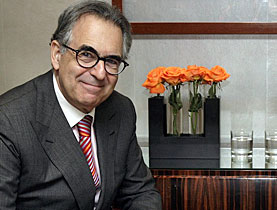
“Art doesn’t have to be explained”

Metin Arditi is a physicist, businessman, writer and president of one of the country's most prestigious musical institutions - the Orchestra of the Suisse Romande.
As the orchestra prepares to celebrate its 90th anniversary Arditi gives his thoughts to swissinfo about classical music and the nature of art.
After starting in physics, he moved into the import business, shipping in high-tech products from Silicon Valley to Switzerland. He then started investing in property before beginning his career as an author ten years ago.
Arditi seems obsessed with just one thing: the truth. While studying at Lausanne’s Federal Institute of Technology, he learnt to question the explanations he was given. And today, he tries to plumb the depths of the human soul.
swissinfo: The Orchestra of the Suisse Romande (OSR) has a good reputation. How would you rate it?
Metin Arditi: The OSR is like Zurich’s Tonhalle Orchestra. It has a very good international standing. It heads abroad regularly and is on tour in Britain now. It has also received a number of awards for its latest recordings.
When it was founded by Ernest Ansermet, the OSR was best known for its French repertoire. The orchestra’s sound was considered a mixture of Germanic rigour and French warmth.
But over the past few years, all the major orchestras have changed considerably. They are playing better than ever and all of them, including the OSR, are hiring musicians from all over the world. So the way they interpret music is becoming more similar.
But they have retained their differences too. American orchestras are particularly brilliant, spectacular – as the Cleveland Orchestra, probably the best in the world, has shown. European orchestras tend to be more like chamber orchestras. But reputations must be defended every day. Nothing is a given. Music is an art, and a reputation is something that must be deserved.
swissinfo: How can you get younger people interested in classical music?
M. A.: It has always been a problem. In the past, children were forced by their parents to listen to an OSR concert. Did they enjoy classical music more than today’s youngsters? I don’t know.
Teenagers have always been sceptical of this music. That’s normal and healthy. They need something that appeals to them immediately, something more violent, with stronger sounds, in phase with the changes their bodies and souls are undergoing.
But we have noticed more young adults attending our concerts and we are trying to reach out to schoolchildren in primary schools. We give 15 concerts per year for this section of the public. It is very successful and complements our concerts for families.
We hope that youngsters learn to feel comfortable in this environment and will come back as they get older. Classical music talks to something deep inside us. So it’s perfectly normal that it generally appeals to an older age group. We aren’t always comfortable dealing with the darkest part of our souls.
swissinfo: Does this explain your love for music and your decision to write?
M. A.: Absolutely, even if my role at the OSR is management. The essence of an artistic event is to create a fraternity. Musicians, dancers, painters, writers all have something to say to other human beings and to show how each person is related to others, even when they are alone.
swissinfo: But many contemporary artists seem to be intent on criticising the world around them. Isn’t that a contradiction?
M.A.: Nobody has to like everything. When a visual artist does his or her work by trying to reflect our humanity and create emotions, I can accept that. But if they want to be sociologists, I’m not interested because they usually aren’t competent.
Artists shouldn’t try to be what they aren’t. Artwork should not require previous knowledge. When you look at Picasso’s Guernica, you don’t need to know anything about cubism to feel connected. It’s someone wanting to share a truly violent emotion, and it’s a scream that rips through your heart.
swissinfo-interview: Frédéric Burnand in Geneva
Metin Arditi was born in the Turkish capital Ankara on February 2, 1945.
He moved to Switzerland at age seven, and from 1963 onwards studied nuclear engineering at Lausanne University’s polytechnic school (today the Federal Institute of Technology.)
From 1968, he pursued business studies at California’s Stanford University.
In 1970, he started working for McKinsey before creating his own companies in the property and investment sectors.
In 1988 he created a foundation that awards prizes and grants to graduates of Geneva University and Lausanne’s Federal Institute of Technology.
He has also been a major supporter of the arts and cultural institutions such as the Orchestra of Suisse Romande.
Arditi published his first essay in 1997, and his first novel in 2004.
The OSR is celebrating its 90th anniversary in 2008.
The orchestra is holding a series of five concerts to mark the occasion, each including two violin concertos.
Management has called on the best young violin soloists around, all aged between 20 and 30.

In compliance with the JTI standards
More: SWI swissinfo.ch certified by the Journalism Trust Initiative


























You can find an overview of ongoing debates with our journalists here . Please join us!
If you want to start a conversation about a topic raised in this article or want to report factual errors, email us at english@swissinfo.ch.